#Sunflower Identity
Explore tagged Tumblr posts
Text
Lex # 4902
♥Hair: DOUX – Winter hairstyle by dam1710 ♥Head: LeLUTKA Avalon Head 3.1 by jaden.nova ♥Body: eBODY – REBORN – by eBODY ♥Skin: Fallen Gods Inc. Pure [xx]+FGInc.+ Terra Humanitas by Alia Baroque @ The Liaison Collaborative ♥Face tatto: Taf, face tattoo + Fallen Gods Inc. by Alia Baroque @ The Liaison Collaborative ♥Tattoo:Fewness – Your Sign – Cancer by Fewn Daddy ♥Tattoo: Puddles. Zodiac…

View On WordPress
0 notes
Text
There's been a lot of harmful invalidation and misinformation floating around trauma spaces lately about the cause of complex dissociative disorders like DID. Please, let's put to rest the trauma olympics and claiming that certain childhood traumas are more "valid" than others. The childhood trauma that causes someone's DID does not need to be sexual or physical abuse, or even abuse at all.
From Understanding and Treating Dissociative Identity Disorder: A Relational Approach, by Elizabeth Howell (pages xvii - xviii):
"DID is usually the outcome of chronic and severe childhood trauma, which can include physical and sexual abuse, extreme and recurrent terror, repeated medical trauma, and extreme neglect. Pathological dissociation generally results from being psychically overwhelmed by trauma. . . . However, the traumatic experiences that may result in dissociative disorders do not always stem from sexual, physical, or emotional abuse. Disorganized attachment which often underlies the dissociative structure of dissociative disorders . . . may result from overwhelming experiences in the infant's interpersonal environment that are not caused by parental maltreatment. Parental illness, depression, or problematic attachment styles may be psychically overwhelming and lead to disorganized attachment. In addition, medical trauma may be dissociogenic. For example, some dissociative patients have reported histories of chronic medical problems and hospitalizations that involved severe pain and unavoidable separations from well-meaning parents. Medical trauma may involve both the chronic and severe pain of certain diseases and conditions as well as painful procedures intended to remediate these medical conditions. Some dissociative adult patients have reported the trauma of being left alone to suffer their pain as children in the hospital. Such children may be additionally confused by the fact that their parents are either hurting them, as part of necessary medical interventions or allowing others to hurt them . . ."
You can find a free download of this book and others [here]. I highly recommend reading it, it's one of my favorite books on DID. If you're able to, please consider purchasing a copy of it to support the author too!
Anyways, if you're reading this and you've been harmed by the recent influx of trauma invalidation, please know that I'm here for you. I believe you. Your trauma is REAL and it was ENOUGH to cause your disorder. You were a child and no child deserves to go through trauma. No one.
#sunflower posts#actuallydid#actuallyosdd#actuallycdd#actuallytraumagenic#actuallydissociative#actuallytraumatized#syscourse#dissociative identity disorder#dissociation#complex dissociative disorder#did support#did informative#trauma tw#abuse tw
391 notes
·
View notes
Note
Emma we need your help somehow Emily and Freddy got stuck in a tree during a match

#idv#identity v#emma woods#identity v gardener#survivor ask blog#idv gardener#ask emma woods#identityv#identity v ask blog#you are loved by sunflowers#mentions:#freddy riley#emily dyer#axe boy
118 notes
·
View notes
Text

I want to share this archive of Multiple Personality Gift -- a workbook for people who have or are questioning DID or any sort of trauma-formed system. I believe it was written back in 1991 by Jacklyn M. Pia, a satanic ritual abuse survivor and DID system.
Click here to read it.
It's pretty short but a wonderful read, nonetheless! 😊💕 Although the information about DID is somewhat outdated, there's so much love and positivity put into this workbook. Many of the tips they give about system management are things that I also learned in therapy for my DID. It can be very, very helpful. I hope you guys enjoy reading it!
(Disclaimer: This is an archiving blog that posts about plural history. The events and resources in this post are from the past. Please be mindful that language/views especially regarding mental disorders changes over time. Sources on this post may not reflect up-to-date info on dissociative disorders or plurality.)
#plural deep dive#plural history#did history#actuallydid#dissociative identity disorder#plurality#pluralgang#pluraldeepdive#sunflower posts
78 notes
·
View notes
Text

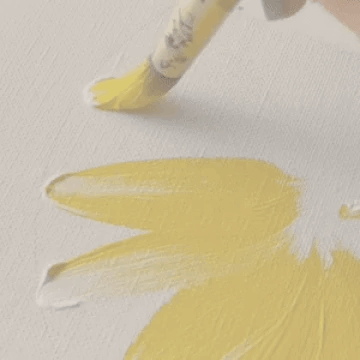

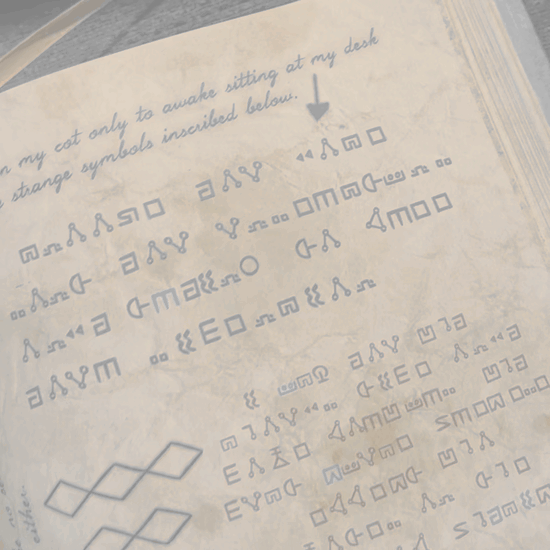



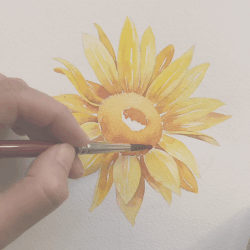


STIMBOARD - AESOP CARL
[ x x x - x ⚰️ x - x x x ] - [ requested by anon ] > custom requests: yellow and grey, no food

thank you anon!!! He's actually one of my faves from my idv phase :')
also, ik they're already linked but people should check out that cosplayer, they're really talented!
#stimboard#stim#identity v#idv#aesop carl#idv embalmer#identity v embalmber#flowers#sunflower#writing#book#cosplay#cosplayer#paintbrush#yellow#grey#gray#QUEUE
52 notes
·
View notes
Text
finally getting a chance to sit down and read the hotguy comic zine and oh my goddd.
striking me that Kryptonite by 3 Doors Down is very, very much a Hotguy-like song
#...incredibly unlikely but hey what if I wrote like. a drabble on it#becoming so much less normal about sunflower duo by the second#anyway. spoilers for up until about page 190 of the zine. But can you imagine.#Hotguy sitting high up and overlooking the city in the middle of the night because he couldn't sleep with so much on his mind#staring into the distance and just thinking#Is what they're doing right?#Pearl sees Scar leave his apartment only to climb to the tallest tower in Hermitopia#she follows him masked as Scour and finds him sitting recklessly close to the edge#she pulls him back by the collar#(not sure if they explicitly talk about the whole I'm-not-giving-away-your-identity in the zine - haven't got there yet. but they wouldn't#necessarily talk about that here. I think they would just sit in silence together for a while. they deserve it)#this is quickly turning into an approximation of that one scene from spiderman: across the spiderverse. but yeah#my posts#hotguy comics zine liveblogging#except it's weeks later#don't remember if that's the official tag but whatever
9 notes
·
View notes
Text
I watched Dr. Robinson's lecture on social media & self diagnosed DID (didn't watch the Q&A part though). It was a surprisingly decent lecture for the complex subject it's tackling! I took notes throughout the entire video if anyone is interested & doesn't want to watch the hour long video (but I recommend you do so you can form your own thoughts on it).
Here's a link to the video.
My notes are under the cut. If you want, you can read a short version here.
Important to keep in mind: Dr. Robinson says that the TikToks he shares in the lecture are for illustrative purposes. He knows nothing about the people behind them, and he cannot verify who does or does not have DID. Further in the video he says that harassing or fakeclaiming people who say they have DID, regardless if they actually have it, does extreme harm. Despite that, it still feels inappropriate that they used these TikToks without permission, and without censoring.
The introduction starts off with describing how the DID patients in their clinic look nothing like the sensationalized portrayal of DID in media. People with DID experience distress & confusion towards their symptoms, which they are reluctant or ashamed to report. Many of their patients report feeling distraught/confused by online content where people promote DID symptoms openly in a fun, sensationalized way. For illustrative purposes, Dr. Robinson shows a TikTok of a person asking their partner to guess which alter is fronting. It's a bunch of clips cut together of them going "guess who's fronting!" in a different voice and their partner gets it correct every time, like a little game.
He explains how recently, many people are coming into the clinic self-diagnosing as DID. They do not have a trauma history and their parts are character-like. The symptoms they present are not typical to DID.
He shows a TikTok of someone changing outfits to music, with the caption asking to guess which system member is wearing what. Robinson says that these overt changes in wardrobe are not characteristic of DID. Nearly all patients with DID are reluctant to discuss their symptoms and conceal it. So this begs these questions: Do online influencers genuinely have DID? If not, what are they experiencing? And what role does social media play in self-diagnosis & the perception of DID?
DID is considered the most severe/complex trauma-related dissociative disorder. It involves symptoms of:
Depersonalization Derealization Amnesia Identity Confusion Identity Alteration At times, pwDID report experiencing someone in their mind who is "not me." At times, it feels like someone else is "driving" the body with a distinct set of thoughts & behaviors. Shifts are subtle or completely hidden. Dr. Robinson emphasizes that they rarely see obvious signs of switching or changes like what was depicted in the video earlier.
What's interesting to me is that he describes amnesia in DID as only being trauma-related… From what I understand, however, amnesia in DID can apply to everyday life as well.
He states that identity alteration (alters, switching) is the most sensationalized symptom of DID. Agreed. DID is not an alters disorder. "DID is really about the 'not me' experience." It is about wanting to get through everyday life without having to re-experience overwhelming trauma info.
He brings up media portrayals of DID like Split & the United States of Tara which have sensationalized the alters aspect of DID. This media has also perpetuated other myths such as the idea that pwDID are dangerous or extraordinary.
He talks about the development of DID. It's a posttraumatic disorder. Requires chronic, severe trauma during early development. In the absence of nurturing & soothing adults, the child internalizes aspects of their environment. The process of personality development is fragmented & those personality parts are anthropomorphized.
DID is really a disorder of hiddenness, he says. That's why it's surprising to see so many people online coming out and celebrating the diagnosis.
He uses a TikTok video of someone saying they got diagnosed with DID & that they're going to get a cake to celebrate. They literally ask the bakery person to write the phrase "happy DID diagnosis" on it. Omg I would not have the balls to do that… Tbh I don't vibe with thinking it's bad to feel happy/relieved about your diagnosis. I think more people should feel happy about it, because in the past it was so common to feel like a diagnosis was more like a death sentence. Robinson says that patients usually feel more fear after getting diagnosed, but that's not a good thing in my opinion.
The problem here shouldn't be that someone is happy/relieved they got an answer to their questions & a label for their pain. The problem here should be the sensationalization. It should be about how they boosted the entertainment value of it for profit.
He describes the history of DID being delegitimized. Freud decided it was false memories, then there was false memory syndrome. Etc. Etc. In the most recent decades, there has been so much more research & support for DID as a legitimate, trauma-based disorder. But many people still don't believe it and false memory controversy is still perpetuated. Robinson says that the recent trend of inaccurate social media representations is further delegitimizing DID.
At the heart of DID controversy there are two models for it:
Trauma model: DID is trauma-related and trauma memories are true
Fantasy model: DID is unrelated to trauma, resulted from fantasy-proneness or suggestibility, influenced by social media or other factors, and trauma memories are exaggerated or simply not true
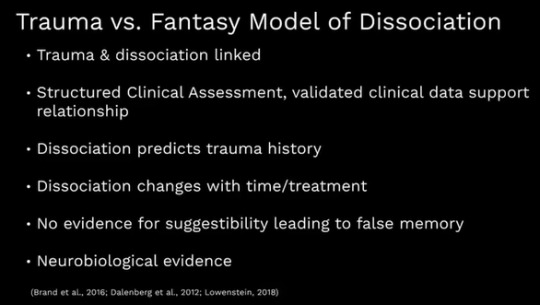
He discusses the neuroscience behind it! Researchers are finding that DID has a unique biological imprint, further supporting its legitimacy as a real, trauma-based disorder.
Robinson says that people with DID have always been online & had online communities. Yet, specifically in facebook, youtube, instagram, TikTok, and twitter we see an issue. They are a bit different because (on the monthly) the active users are up in the billions. They are also algorithm-based, so liking content on DID will result in your feed giving you more DID content. The pandemic has also further driven people to social media, too.
TikTok DID hashtags get billions of views.. Robinson says these views have grown by 200-400 MILLION over the past 4 months.
PROS of discussing DID on the internet:
Evidence & info on DID is becoming widely & easily available. More resources for people. This has created safe spaces online for people who are trauma survivors, researchers, & clinicians. With so much good information, many of the false representations & misinfo can be countered. This means that many people can self-diagnose accurately! There's been a general destigmatization of DID online. The dominant narrative is no longer skeptical.
CONS of discussing DID on the internet:
There is also more inaccurate information. Most of the time the representation of DID is wrong. This leads to inaccurate self-diagnosing. People (especially young people) may attach clinical labels to normal experiences. They may elaborate or manifest DID-like symptoms instead of acknowledging they have a different problem. COVID has made people more vulnerable to this. There is also significant online harassment & fakeclaiming towards DID influencers.
FAKECLAIMING HARMS EVERYONE WITH AND WITHOUT DID. Robinson says that fearing you may be faking is one of the most common symptoms of DID. Regardless if someone genuinely has DID or not, calling them fake will harm both them and all other people with DID.
Now, I find it a bit questionable that they are using uncensored TikToks in this lecture despite acknowledging that these people face elevated fakeclaiming & harassment... I get that it's for educational purposes but it feels especially inappropriate when acknowledging this.
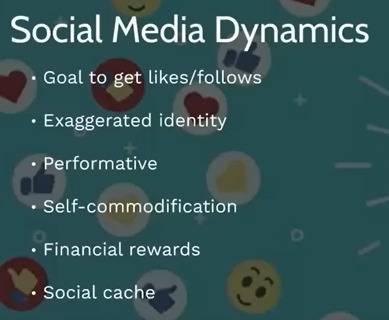
Social media has dynamics that reinforce these uncharacteristic DID representations. It rewards people who create attention-grabbing content for likes & follows, regardless if the content is true. That's why you can't know if someone is faking just because of their uncharacteristic portrayal, because it's possible that social media is influencing them to express themselves in different ways. But, it's also possible that these dynamics are still contributing to an increase of inaccurate self-diagnosis.
He brings up someone called the ace system (?) who has generated millions of views. I have NO IDEA how to describe the TikTok he just played. It was like…snippets of different system members talking about their day? They talked about panic attacks and stuff. They also switched so much in just one day. Seems exhausting.
Robinson does say "it's possible that some social media influencers like the ace system(?) may be malingering or have factitious disorders" which I personally don't see as him doubting that person in particular. He's not saying THIS PERSON IS MALINGERING, he's just saying some people might be malingering but we really wouldn't know as onlookers.
Describing what malingering & factitious disorders are now.
Malingering: intentional reporting of symptoms for some external gain like money
Factitious: intentional reporting of symptoms, but not just for som external gain
For illustration of external gain (which isn't inherently malingering), he's showing the ace system's (?) merchandise website. Then a cameo account where you can book a personalized video from the system. Another TikTok system he showed earlier makes a reappearance, this time to show that they are selling hats that their system made.
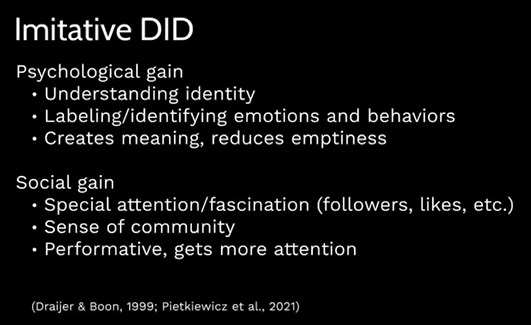
Imitative DID is for people who do not actually have DID but genuinely believe that they do. They may benefit from psychological or social gain, which makes social media platforms the ideal platform for them to thrive. Claiming they have DID might provide them a sense of connection/community. They may struggle with their identity such as who they are in the world, what community they belong in, who they'll be in the future, etc. Robinson says that "the DID narrative helps these people explain frequent confusion about who they really are."
Dr. Robinson says that endogenic systems (which he also just calls plurality/multiplicity) can sometimes be an example of Imitated DID. He mentions Astraeasweb from the 90s claiming nonpathological multiplicity/plurality as an identity. He plays a new TikTok of someone telling people to look up The Plural Association and "welcome to the plural community" and tips on how to start system communication.
He says that people with DID don't choose this or wish for this. The symptoms are developed out of need for survival.
Endogenic plurality refers to any development of plurality that does not have a trauma origin. They promote their plurality as a healthy way of their mind working; an identity. Some of them don't identify as having DID, but Dr. Robinson says that many do (I personally think it's the opposite but *shrugs* he might be lumping all cases of imitative DID in there).
He says that more research needs to be done to see if endogenics are genuine DID, imitated DID, or something else entirely.
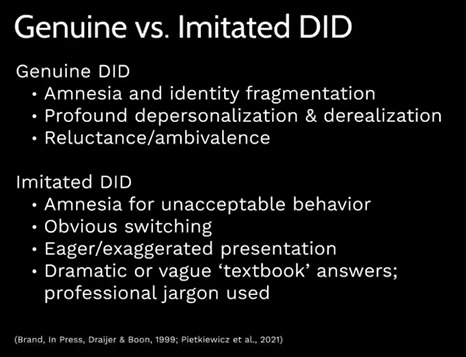
Dramatized, obvious switching is actually very rare in DID. Yet, it's very common in online videos. He shows a TikTok of someone sitting in a car who is "switching." They stare into space, close their eyes slowly, drop their head down for a while, then they lift their head up and smile. He shows another TikTok of someone who also drops their head down (it says "no one in the body"?) and after a long time, they lift their head up, start swearing(????), and then cheekily take their name tag off while staring at the camera.
Robinson says that in both of these examples we see an uncharacteristic awareness of the process of dissociation, because these individuals could actually plan for and videotape what was going to happen. He says the switches in genuine DID are subtle and often unnoticed by outside observers.
In imitative DID there is also an emphasis on elaborated parts. They lack the confusion & distress/conflict with these parts which is characteristic of DID. He shows a TikTok of someone showing Picrews of their parts. Then he shows another TikTok with someone playing guess-who trying to figure out who is fronting. So literally playing a game. "A game-like way of presenting symptoms that would be very distressing in genuine DID," Robinson says about that video.
There was a recent case study that interviewed people who were not given the diagnosis of DID and found that they were angry + relying on the diagnosis for connection & attention.
Once again, he says it's difficult to distinguish whether social media influencers are genuine, malingered, imitative, or something else. It's not something even professionals can distinguish as onlookers. We don't know anything about the people in the video examples except for what they put out online.
To conclude the lecture, Dr. Robinson says that accurate online information & professional education is MORE IMPORTANT THAN EVER given the increase of DID awareness. Wrong info & poor representations delegitimizes DID and causes harm. We don't want it to undermine all of the progress in research in the recent years.
#syscourse#dissociative identity disorder#social media and the rise of self-diagnosed dissociative identity disorder#mclean hospital#long post#sunflower posts
77 notes
·
View notes
Text

#identity v#andrew kreiss#idv grave keeper#andrew idv#grave keeper idv#fanart#identity v gravekeeper#idv gravekeeper#sunflower
32 notes
·
View notes
Text
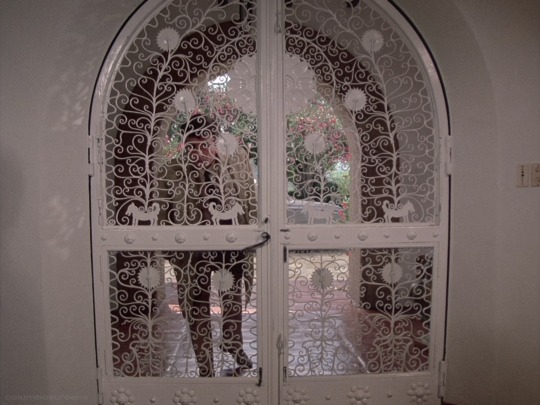
#columbo#season 5#identity crisis#going to let him in through your whimsical curlicue sunflower doggie wrought iron doorway?
57 notes
·
View notes
Note
Are there any colors that you dislike, glass artist?
— 🌻 anon
"Hm... Thats a tad of a complicated question for glass art as to get a color, one must "play chemist" so to speak. So you have to work with many colors sometimes to get another one." A light laugh bubbled up in Delilah's voice as she spoke. "Personally, I'm not a huge fan of colors that are made when you mix silver sheets. While I do use them often in projects, its certainly not one of my favorites as they're appearance is duller. Its not one I'd particularly like to use as a centerpiece."
"If you ment for colors in general, I'd say bright lime greens. I can never make them look good in my outfits."
-Ⴑ(‘❁◡❁’)Ⴑ
-ˋˏ ༻❁༺ ˎˊ-
#rp response#The Glass Artist#identity v#idv ocs#idv oc ask blog#idv askblog#oc#Anon Visits#Sunflower Anon
4 notes
·
View notes
Note
wake up in the mornin feeling like p-diddy
-🌻
(Hey, what up, girl?)
Grab my glasses; I'm out the door, I'm gonna hit this city (Let's go!)
Before I leave, brush my teeth, with a bottle of Jack
'Cause when I leave for the night I ain't comin' back
I'm talkin' pedicure on our toes, toes
Tryin' on all our clothes, clothes
Boys blowin' up our phones, phones
Drop-toppin', playin' our favorite CDs
Pullin' up to the parties
Tryin' to get a little bit tipsy
Don't stop, make it pop, D.J., blow my speakers up
Tonight, I'ma fight 'til we see the sunlight
Tik tok, on the clock, but the party don't stop, no
Oh-ooh, oh-ooh, whoa-oh
Oh-ooh, oh-ooh, whoa-oh
Don't stop, make it pop, D.J., blow my speakers up
Tonight, I'ma fight 'til we see the sunlight
Tik tok, on the clock, but the party don't stop, no
Oh-ooh, oh-ooh, whoa-oh
Oh-ooh, oh-ooh, whoa-oh
Ain't got a care in the world, but got plenty of beer
Ain't got no money in my pocket, but I'm already here
And now the dudes are linin' up 'cause they hear we got swagger
But we kick 'em to the curb unless they look like Mick Jagger
I'm talkin' 'bout everybody gettin' crunk, crunk
Boys tryin' to touch my junk, junk
Gonna smack him if he gettin' too drunk, drunk
Now, now we go until they kick us out, out
Or the police shut us down, down
Police shut us down, down, po-po-, shut us (Down)
Don't stop, make it pop, D.J., blow my speakers up
Tonight, I'ma fight 'til we see the sunlight
Tik tok, on the clock, but the party don't stop, no
Oh-ooh, oh-ooh, whoa-oh
Oh-ooh, oh-ooh, whoa-oh
Don't stop, make it pop, D.J., blow my speakers up
Tonight, I'ma fight 'til we see the sunlight
Tik tok, on the clock, but the party don't stop, no
Oh-ooh, oh-ooh, whoa-oh
Oh-ooh, oh-ooh, whoa-oh
D.J., you build me up, you break me down
My heart, it pounds, yeah, you got me
With my hands up, you got me now
You got that sound, yeah, you got me
D.J., you build me up, you break me down
My heart, it pounds, yeah, you got me
With my hands up, put your hands up
Put your hands up
Now, the party don't start 'til I walk in
Don't stop, make it pop, D.J., blow my speakers up
Tonight, I'ma fight 'til we see the sunlight
Tik tok, on the clock, but the party don't stop, no
Oh-ooh, oh-ooh, whoa-oh
Oh-ooh, oh-ooh, whoa-oh
Don't stop, make it pop, D.J., blow my speakers up
Tonight, I'ma fight 'til we see the sunlight
Tik tok, on the clock, but the party don't stop, no
Oh-ooh, oh-ooh, whoa-oh
Oh-ooh, oh-ooh, whoa-oh
5 notes
·
View notes
Text
Lex # 4845
♥Fern Cottage ^FC^ Christmas Bentwood Rocker by ferncottage @ The Liaison Collaborative ♥Sunflower Identity Sunflower ID Winter Fireplace White by passiel.littlepaws @ The Liaison Collaborative ♥Stonemill – Mushaboom Desk Lamp – Fatpack by stonemillstore @ The Liaison Collaborative ♥Hearth – Snowman Christmas Cookies by hearthdecor @ The Liaison Collaborative ♥Hearth – Gingerbread Christmas…

View On WordPress
#*~*HopScotch*~*#Fern Cottage#Group gift#Half-Deer#Hearth#Hop&Shop#JIAN#Petit Chat#Something Decor#Stonemill#Sunflower Identity#The Liaison Collaborative
0 notes
Text
Things that can happen in DID/OSDD but people don’t talk about them as much:
An alter being co-conscious or influencing you without you knowing.
Being aware of a co-con alter but not knowing who they are.
Having difficulty telling apart your inner experiences. (Was that an alter or was I just feeling differently or was I just daydreaming?)
Having difficulty identifying your own emotions. (I feel “something”)
Knowing how to do something yet feeling like you don’t or shouldn’t know how to do it. (How do I know how to use this phone? I feel like it’s 1998 when I didn’t know what a phone was yet.)
Being in a familiar place/situation yet feeling confused, like it’s unfamiliar. (I’ve lived in this house for 7 years but I feel like this is my first time ever being in it.)
Being confused that your body is smaller/taller than you thought.
Feeling or being unable to do things that you normally can do at other times. (I just couldn’t drive the other day. I don’t know how. I just forgot how to do it.)
Things that happened a few days ago feel like months ago, or things that happened months ago feel like a few days ago.
Experiencing pain, headaches, visual impairment, or other physical symptoms that doctors can’t find a cause for.
Waking up as a different alter than the one who went to bed.
A co-conscious alter being able to influence or take control of certain body parts (like using the arms to hold & comfort you).
Being unable to tell if you’re dreaming or awake.
Feel free to add on!
#actuallydid#actuallyosdd#actuallydissociative#actuallytraumagenic#dissociative identity disorder#sunflower posts
2K notes
·
View notes
Note
if you had to rap battle with someone who would it be

Original image:

#idv#identity v#emma woods#identity v gardener#survivor ask blog#idv gardener#ask emma woods#identityv#identity v ask blog#naib sudebar#you are loved by sunflowers#[ last year when I got this ask#househusband immediately came to mind. Thank you rap anon#if you’re still out there. ]#inspired by the line: “Lady Truth says this is just another piece of fashion that is beyond my ken.”
42 notes
·
View notes
Text

"Long ago I began to create other people in my mind's eye who experienced certain experiences instead of myself. I did fairly well for a long time with these girls existing in my mind as ideas for stories I wanted to someday write. But as time went along they began to feel more real to me. I had begun to take them very seriously indeed--not just as characters for stories but as names for parts of myself."
I want to share this archive from 1998 of someone's personal experience with their DID. They describe discovering their system through creating characters and writing stories. They view their system as both parts of themself and as fictional characters that they purposefully created.
Click here to visit the archived website. (Potential TW for mentions of abuse and trauma!)
DISCLAIMER: Since this is about someone's interpretation of their own personal experiences, I ask that people please be respectful in the comments. Please be mindful that this is a snapshot of the past; language/views especially regarding mental disorders change over time. Regardless of your views on DID or systems, I will not tolerate anyone disrespecting or speculating about this person's life and mental health.
#plural deep dive#plurality#pluralgang#dissociative identity disorder#did history#plural history#sunflower posts
62 notes
·
View notes
Text
I feel like stardew valley doesn't stick to its themes in its entirely through its game play elements
#random thoughts#stardew valley#why is the bus bundle entirely composed of monetary donations to the junimos#why do they need money they're fucking fruits#why is joja mart in its entirety so poorly designed. the fucking sunflowers.#why are people offering money in exchange for goods on the bulletin board#wouldn't it be more in the spirit of the game to have the rewards be items or relationship points#why is linus Like That#why are all crafting processes essentially the same. why is the process behind making a fence essentially identical to making cookies#why is having animals such a fucking chore
8 notes
·
View notes